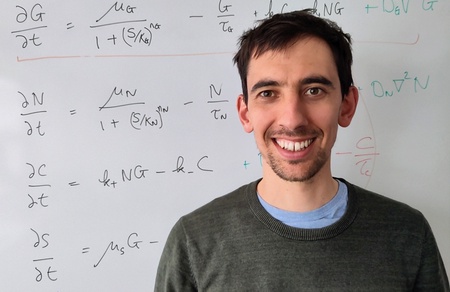A University of Aberdeen scientist has received European Union funding of 1.5million Euros through the European Research Council (ERC) initiative to enable talented young researchers to pursue their most promising ideas.
Dr Tom Hiscock will use the funding to follow in the footsteps of Enigma code breaker Alan Turing.
Turing believed that embryonic development – the transformation of a simple embryo into a complex animal or human – could be reduced to mathematical axioms and physical laws. In 1952, in what would be his final published work, he used maths to suggest that many patterns found in nature (e.g., fingers, leaves, hair) might be formed by intricate chemical reactions within developing embryos.
However, to this day, Turing’s reaction-diffusion hypothesis remains controversial and there are many patterns it cannot explain.
Dr Hiscock will combine his training in physics with a love for developmental biology to build more accurate – and therefore much more complex – models of these chemical reactions. By working closely with collaborators in the UK and Switzerland, who work on many different species of animal, he hopes to find completely new ways that chemical reactions can form patterns beyond Turing’s original hypothesis
He explains: “A multicellular organism – whether human, animal, or plant – begins its life as a very small and very simple single-celled embryo. This embryo then does something remarkable – it transforms into a highly complex organism with many different shapes, patterns, organs, and cell types. The amazing thing is that - unlike man-made structures, which are built by architects and engineers – embryos must build themselves.
“In this work, we will be building mathematical models of embryos to understand the mysterious ways in which they self-assemble into complex animals. In particular, we will focus on the genetically-encoded chemical reactions that drive embryonic development, inspired by the pioneering work of the famous code-breaker Alan Turing.
“Our models will be challenged by data from various biological systems, including published datasets as well as close collaborations with experimentalists, taking advantage of the increasing availability of high-resolution quantitative data.”
The grant is one of 494 Starting Grants awarded to young scientists and scholars across Europe by the European Funding Council (ERC).
The funding - totalling nearly €780 million - supports cutting-edge research in a wide range of fields, from life sciences and physics to social sciences and humanities. It will help researchers at the beginning of their careers to launch their own projects, form their teams and pursue their most promising ideas.
President of the European Research Council, Prof. Maria Leptin, said: “Empowering researchers early on in their careers is at the heart of the mission of the ERC. I am particularly pleased to welcome UK researchers back to the ERC. They have been sorely missed over the past years. With fifty grants awarded to researchers based in the UK, this influx is good for the research community overall.”


